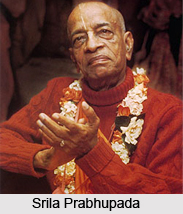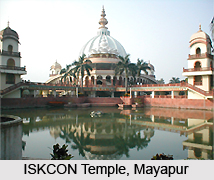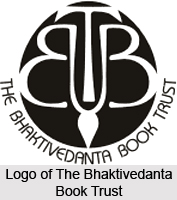 A.C. Bhaktivedanta Swami Prabhupada was born in September 1,1896 in Calcutta, India. He met with his spiritual Guru, Srila Bhaktisiddhanta Sararaswati Goswami, in Calcutta in 1922. Bhaktisiddhanta Saraswati was a prominent devotional scholar and founded sixty-four branches of Gaudiya Mathas(Vedic Institutes). Srila Prabhupada was born as Abhay Charan De. He studied in Scottish Church College, Calcutta that was then under the British administration. Before he left for pious renunciation in the year 1950, he was married and had children. He owed a small pharmaceutical business. Later, in the year 1959, he took Sannyasa or a vow of renunciation.
A.C. Bhaktivedanta Swami Prabhupada was born in September 1,1896 in Calcutta, India. He met with his spiritual Guru, Srila Bhaktisiddhanta Sararaswati Goswami, in Calcutta in 1922. Bhaktisiddhanta Saraswati was a prominent devotional scholar and founded sixty-four branches of Gaudiya Mathas(Vedic Institutes). Srila Prabhupada was born as Abhay Charan De. He studied in Scottish Church College, Calcutta that was then under the British administration. Before he left for pious renunciation in the year 1950, he was married and had children. He owed a small pharmaceutical business. Later, in the year 1959, he took Sannyasa or a vow of renunciation.
As a Vaishnava Sadhu, he became an influential communicator of Gaudiya Vaishnava Theology to India and specifically to the west through his leadership of the International Society for Krishna Consciousness (ISKCON). The society was founded in the year 1966. Srila Prabhupada has been described as the charismatic leader and he had many followers in India and abroad. The religious leaders from other Gaudiya Vaishnava movements have praised him. Swami B.A. Paramadvaiti has written about Srila Prabhupada : "Bhaktivedanta Swami Maharaja surprised the entire world as well as his godbrothers with his outstanding achievements. He single handedly fulfilled the prediction of Sri Chaitanya Mahaprabhu, "The Holy Names of Krishna will be sung in every town and village in the world.""
Srila Bhaktisiddhanta Sarasvati Thakura asked Prabhupada to spread the message of Chaitanya Mahaprabhu in the English language. Later in the year 1932, Prabhupada became a formal disciple of Bhaktisiddhanta and in 1944 he started to publish fortnightly `Back to Godhead` for which he acted as publisher, editor, copy editor and distributor.
In the year 1947, the Gaudiya Vaishnava Society recognized Prabhupada with the honorable title Bhaktivedanta, meaning `one who has realized that devotional service to the supreme Lord is the end of the knowledge". From then on he was recognized by the name "Prabhupada", literally meaning `he, who has taken the position of the lord` or `One who is representing Krishna". Prabhupada represented Krishna consciousness among his disciples in America.
From 1950 onwards Prabhupada lived in the medieval temple of `Radha-Damodara` in the holy city of Vrindavan in north India. There he began his translation work on the Sanskrit epic Srimad Bhagvatam. His Guru Srila Bhaktisiddhanta Saraswati Goswami had always encouraged him to publish books if he had any money. He had many fundamental works on Chitanya Charitamrita, Srimad Bhagbhat, Bhagbatam Gita.
 Srila Prabhupada took Sannyasa (renunciation) vows in 1959 from his godbrother Bhakti Prajnana Keshava Maharaja at Mathura. After this Prabhupada single-handedly published the first three volumes of Bhagvata Purana. He translated thirty volumes of eighteen thousand verse of Bhagavata Purana with detailed commentary. He then left India as he obtained free passage on a cargo ship named `Jaladuta`. He aimed at spreading the ideas of Sri Chaitanya Mahaprabhu in the world as his Guru said. He had only a suitcase, an umbrella, some dry cereal, few boxes of books and seven rupees Indian currency.
Srila Prabhupada took Sannyasa (renunciation) vows in 1959 from his godbrother Bhakti Prajnana Keshava Maharaja at Mathura. After this Prabhupada single-handedly published the first three volumes of Bhagvata Purana. He translated thirty volumes of eighteen thousand verse of Bhagavata Purana with detailed commentary. He then left India as he obtained free passage on a cargo ship named `Jaladuta`. He aimed at spreading the ideas of Sri Chaitanya Mahaprabhu in the world as his Guru said. He had only a suitcase, an umbrella, some dry cereal, few boxes of books and seven rupees Indian currency.
Prabhupada landed at New York City in the year 1965; By July 1966 he had brought the slogan `Hare Krishna` to the west and founded ISKCON in the New York City. Prabhupada spent much of the last part of his life in establishing the institution of ISKCON. He was the leader of the society and ISKCON grew much and fulfilled his mission.
When ISKCON was well established in New York another center started in San Francisco. From here Prabhupada traveled throughout USA with his disciples, popularizing the ISKCON movement through street chanting, book distribution and public speeches.
When ISKCON was more established in USA, a small group of devotees from San Franscisco temple were sent to London in England. After they had been in London, they came in contact with the Beatles. George Harrison took great interest in ISKCON and spent a significant time in discussion with Prabhupada and produced a record with the members of the ISKCON. Radha-Krishna temple was established in London. Prabhupada had tour around the world and he set up temples and communities in all the major continents. Eleven years later, Prabhupada passed away in Vrindavan in 1977. By that time ISKCON became the symbol of Vaishnavism in all over the world.

Prabhupada stayed for about twelve years in abroad. He circled the globe for fourteen times and went to six continents. Prabhupada had introduced Vedic Gurukul ediucation to the Western countries. He founded Bhktivedanta Book Trust, which was world`s largest publisher of ancient and classical vaishnava religious texts. Prabhupada founded religious colony New Vrindavan in West Virginia. He authored sixty books on Vedantic philosophy, religion, literature and culture. He also wrote four books in Bengali. Under Prabhupada`s leadership ISKCON a confederation of more than hundred schools, temples, institutes, farm communities and ashramas were formed. Through his mission, Prabhupada followed and communicated the teachings of Chaitanya Mahaprabhu. He introduced Bhakti Yoga movement to the international audience.
In the year 1972, Srila Prabhupada introduced the Vedic system of primary and secondary education in the West by establishing Gurukula School in Dallas, Texas. The school started with three children and contained one hundred and fifty children by the beginning of 1975.
Srila Prabhupada also inspired the construction of a large international center at Sridhama Mayapur in West Bengal, India. This is considered as the site for a planned Institute of Vedic studies. Also the magnificent Krishna Balarama Temple and International Guest House in Vrindavana, India was done at this time. These are the centers where foreigners can live to have firsthand experience in Vedic Culture.
The most significant contribution of Srila Prabhupada is the books written by him. He earned high respect by the academic community for his authoritativeness, depth and clarity of his writings. His books are used as standard textbooks in religious studies in different colleges. Prabhupada`s books have been translated to eleven languages. The Bhaktivedanta Book Trust was established in 1972, which exclusively published his works, and thus it became the world`s largest publisher of books in the field of Indian religion and philosophy.
In the last decade of his life, in spite of his broken health Srila prabhupada circled the globe for twelve times on lecture tours. Though he had to maintain such a busy schedule, srila Prabhupada continued his writing prolifically. His writings contain many aspects of Indian life like Vedic philosophy, religion, literature and culture.
Prabhupada believed in all cultures and religion. Prabhupada considered Moses, Jesus, and Mohammed to be empowered representatives of God, describing them within his writings as pioneers who carried essential message of dedication to God with love and devotion. Srila Prabhupada wrote :
"Actually, it doesn`t matter - Krishna or Christ - the name is the same. The main point is to follow the injunctions of the Vedic scriptures that recommend chanting the name of God in this age." (from The Science of Self-Realization).









